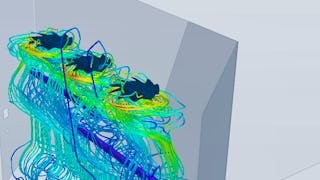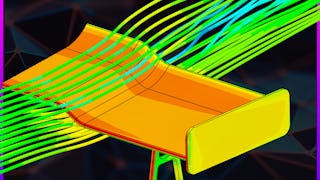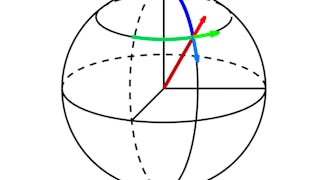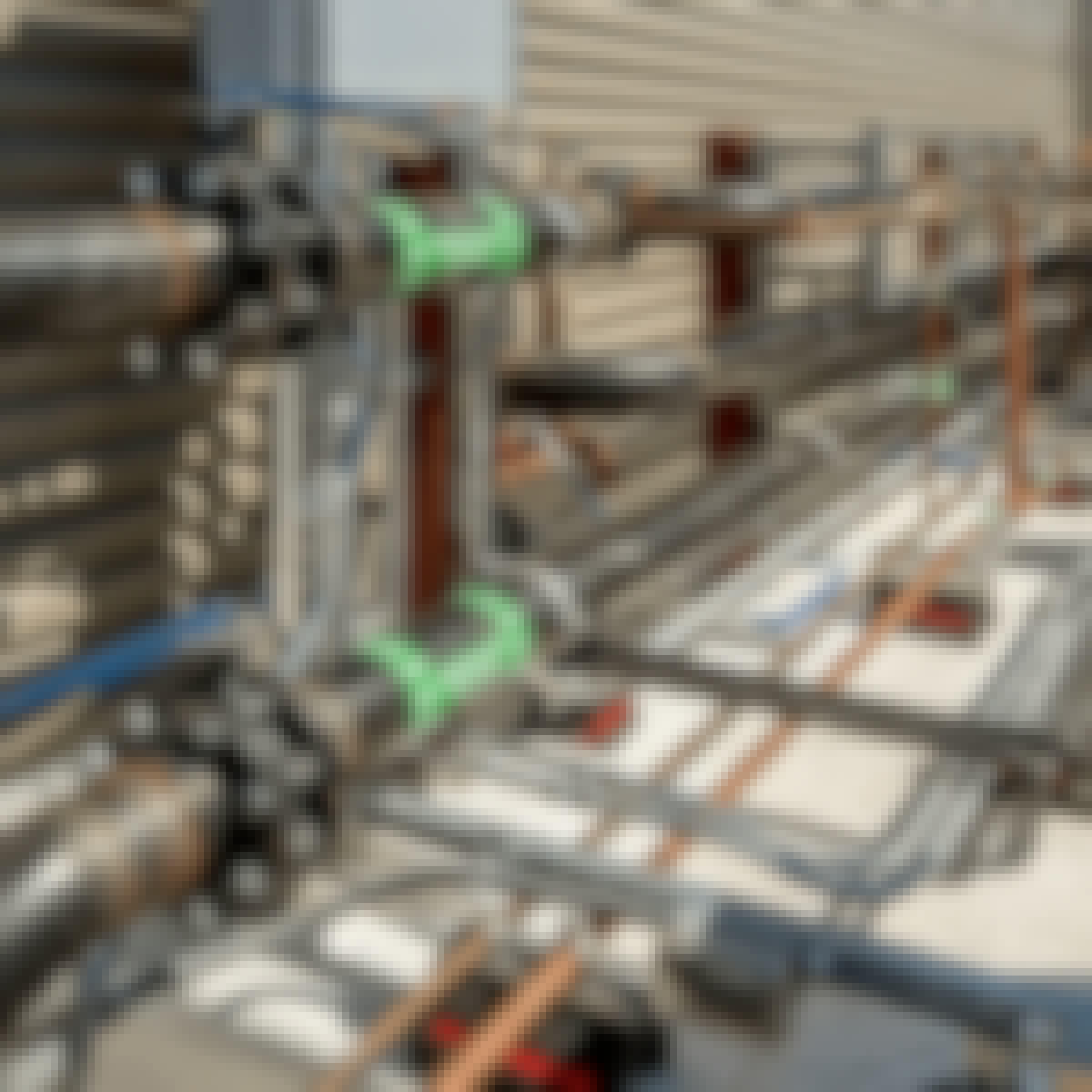- Browse
- Fluid Mechanics
Fluid Mechanics Courses
Fluid mechanics courses can help you learn the principles of fluid behavior, pressure dynamics, and flow analysis. You can build skills in computational fluid dynamics, experimental techniques, and the application of Bernoulli's equation to real-world problems. Many courses introduce tools like MATLAB and ANSYS, which are used for simulating fluid flow and analyzing complex systems, allowing you to visualize and solve practical challenges in engineering and environmental contexts.
Popular Fluid Mechanics Courses and Certifications
 Status: FreeFreeU
Status: FreeFreeUUniversity of Minnesota
Skills you'll gain: Hydraulics, Mechanical Engineering, Schematic Diagrams, Simulation and Simulation Software, Power Electronics, Engineering, Model Based Systems Engineering, Simulations, Engineering Analysis, Control Systems, Automation Engineering, Engineering Calculations, Mechanics, Mathematical Modeling, Matlab
4.8·Rating, 4.8 out of 5 stars1.4K reviewsMixed · Course · 1 - 3 Months
 Status: PreviewPreview
Status: PreviewPreviewSkills you'll gain: Engineering Analysis, Thermal Management, Mechanical Engineering, Simulations, Numerical Analysis, Engineering Calculations, Mathematical Modeling, Chemical Engineering, Scientific Visualization, Physics
4.7·Rating, 4.7 out of 5 stars177 reviewsIntermediate · Course · 1 - 3 Months

Skills you'll gain: Simulation and Simulation Software, Engineering Analysis, Engineering, Prototyping, Computer-Aided Design, Cloud Computing
4.5·Rating, 4.5 out of 5 stars382 reviewsBeginner · Guided Project · Less Than 2 Hours
 Status: Free TrialFree TrialI
Status: Free TrialFree TrialIISAE-SUPAERO
Skills you'll gain: Mechanics, Thermal Management, Energy and Utilities, Hazard Analysis, Risk Control, Physical Science, Simulations, Applied Mathematics, Control Systems, Systems Of Measurement, Vibrations, Engineering Analysis, Engineering Calculations, Physics, Engineering, Mathematical Modeling
4.7·Rating, 4.7 out of 5 stars584 reviewsBeginner · Specialization · 3 - 6 Months
 Status: Free TrialFree TrialI
Status: Free TrialFree TrialIISAE-SUPAERO
Skills you'll gain: Mechanics, Simulations, Engineering Calculations, Physics, Applied Mathematics, Engineering Analysis, Systems Of Measurement
4.7·Rating, 4.7 out of 5 stars489 reviewsBeginner · Course · 1 - 4 Weeks
 Status: Free TrialFree TrialT
Status: Free TrialFree TrialTThe Hong Kong University of Science and Technology
Skills you'll gain: Integral Calculus, Engineering Calculations, Calculus, Engineering Analysis, electromagnetics, Engineering, Geometry, Advanced Mathematics, Mechanical Engineering, Applied Mathematics, Mechanics, Electrical Engineering, Physics, Derivatives
4.8·Rating, 4.8 out of 5 stars1.4K reviewsBeginner · Course · 1 - 3 Months
What brings you to Coursera today?

Skills you'll gain: Simulation and Simulation Software, Simulations, Engineering Design Process, Finite Element Methods, Engineering Analysis, Hydraulics, Cloud-Based Integration, Verification And Validation, Mathematical Modeling
4.6·Rating, 4.6 out of 5 stars288 reviewsBeginner · Guided Project · Less Than 2 Hours
 Status: PreviewPreviewG
Status: PreviewPreviewGGeorgia Institute of Technology
Skills you'll gain: Engineering Analysis, Mechanics, Torque (Physics), Engineering Calculations, Mechanical Engineering, Engineering, Civil Engineering, Structural Analysis, Applied Mathematics, Trigonometry
4.8·Rating, 4.8 out of 5 stars5.1K reviewsMixed · Course · 1 - 3 Months
 Status: Free TrialFree TrialJ
Status: Free TrialFree TrialJJohns Hopkins University
Skills you'll gain: HTML and CSS, Cascading Style Sheets (CSS), Ajax, Javascript, Responsive Web Design, Front-End Web Development, Web Design, Bootstrap (Front-End Framework), Web Development, Development Environment, Web Development Tools, Web Design and Development, JSON, Web Applications, Web Content Accessibility Guidelines, Scripting, Browser Compatibility, Object Oriented Programming (OOP), Event-Driven Programming, User Experience Design
4.7·Rating, 4.7 out of 5 stars17K reviewsBeginner · Specialization · 1 - 3 Months
 Status: Free TrialFree TrialL
Status: Free TrialFree TrialLL&T EduTech
Skills you'll gain: Hydraulics, Engineering Analysis, Engineering Calculations, Mechanical Engineering, Chemical Engineering, Process Flow Diagrams, Process Analysis, Mathematical Modeling
4.4·Rating, 4.4 out of 5 stars50 reviewsIntermediate · Course · 1 - 4 Weeks
 Status: PreviewPreviewÉ
Status: PreviewPreviewÉÉcole Polytechnique
Skills you'll gain: Vibrations, Engineering Analysis, Hydraulics, Environmental Engineering, Civil Engineering, Mechanical Engineering, Engineering, Mechanics, Chemical and Biomedical Engineering, Biological Engineering, Simulations, Mathematical Modeling
4.8·Rating, 4.8 out of 5 stars734 reviewsIntermediate · Course · 1 - 3 Months
 Status: PreviewPreviewG
Status: PreviewPreviewGGeorgia Institute of Technology
Skills you'll gain: Structural Analysis, Mechanical Engineering, Failure Analysis, Engineering Analysis, Mechanics, Materials science, Engineering Calculations, Civil Engineering, Mathematical Modeling, Trigonometry
4.8·Rating, 4.8 out of 5 stars3.5K reviewsMixed · Course · 1 - 3 Months
What brings you to Coursera today?
In summary, here are 10 of our most popular fluid mechanics courses
- Fundamentals of Fluid Power: University of Minnesota
- Applied Computational Fluid Dynamics: Siemens
- Computational Fluid Mechanics - Airflow Around a Spoiler: Coursera
- Fundamentals of Flight mechanics: ISAE-SUPAERO
- Flight mechanics - The basis: ISAE-SUPAERO
- Vector Calculus for Engineers: The Hong Kong University of Science and Technology
- CFD Simulation Through a Centrifugal Pump: Coursera
- Introduction to Engineering Mechanics: Georgia Institute of Technology
- HTML, CSS, and Javascript for Web Developers: Johns Hopkins University
- Single-Phase Pipe Hydraulics and Pipe Sizing: L&T EduTech
Frequently Asked Questions about Fluid Mechanics
Fluid mechanics is the branch of physics that studies the behavior of fluids (liquids and gases) at rest and in motion. It is crucial for understanding various natural phenomena and engineering applications, such as aerodynamics, hydrodynamics, and the design of systems involving fluid flow. The principles of fluid mechanics are essential in fields like aerospace, civil engineering, and environmental science, where they help in designing efficient systems and predicting fluid behavior in different scenarios.
A background in fluid mechanics can lead to various career opportunities. Professionals in this field can work as aerospace engineers, civil engineers, mechanical engineers, or environmental engineers. They may also find roles in research and development, focusing on fluid dynamics, or in industries such as oil and gas, automotive, and water resources management. Positions may involve designing fluid systems, conducting experiments, or developing simulations to analyze fluid behavior.
To excel in fluid mechanics, you should develop a solid foundation in mathematics and physics, particularly calculus and differential equations. Understanding basic principles of mechanics and thermodynamics is also essential. Additionally, skills in computational fluid dynamics (CFD) software and programming can be beneficial, as they allow for the simulation and analysis of fluid behavior in complex systems. Strong analytical and problem-solving skills are crucial for interpreting results and making informed decisions.
There are several online courses available that can help you learn fluid mechanics. Some notable options include the Fundamentals of Flight mechanics Specialization and the Introduction to Mechanics Specialization. These courses cover essential concepts and applications of fluid mechanics, providing a comprehensive understanding of the subject.
Yes. You can start learning fluid mechanics on Coursera for free in two ways:
- Preview the first module of many fluid mechanics courses at no cost. This includes video lessons, readings, graded assignments, and Coursera Coach (where available).
- Start a 7-day free trial for Specializations or Coursera Plus. This gives you full access to all course content across eligible programs within the timeframe of your trial.
If you want to keep learning, earn a certificate in fluid mechanics, or unlock full course access after the preview or trial, you can upgrade or apply for financial aid.
To learn fluid mechanics effectively, start by enrolling in introductory courses that cover the basic principles and applications. Engage with interactive content, such as videos and quizzes, to reinforce your understanding. Additionally, practice solving problems and applying concepts to real-world scenarios. Joining study groups or online forums can also enhance your learning experience by allowing you to discuss topics with peers and seek help when needed.
Fluid mechanics courses typically cover a range of topics, including fluid properties, fluid statics, fluid dynamics, and the principles of conservation of mass, momentum, and energy. You may also explore specific applications, such as flow in pipes, boundary layer theory, and computational fluid dynamics. Advanced courses might explore into specialized areas like aerodynamics or hydrodynamics, providing a deeper understanding of fluid behavior in various contexts.
For training and upskilling employees in fluid mechanics, consider courses like the Analytical Mechanics for Spacecraft Dynamics or Introduction to Engineering Mechanics. These courses provide practical knowledge and skills that can be directly applied in the workplace, enhancing employees' capabilities in fluid mechanics and related fields.










